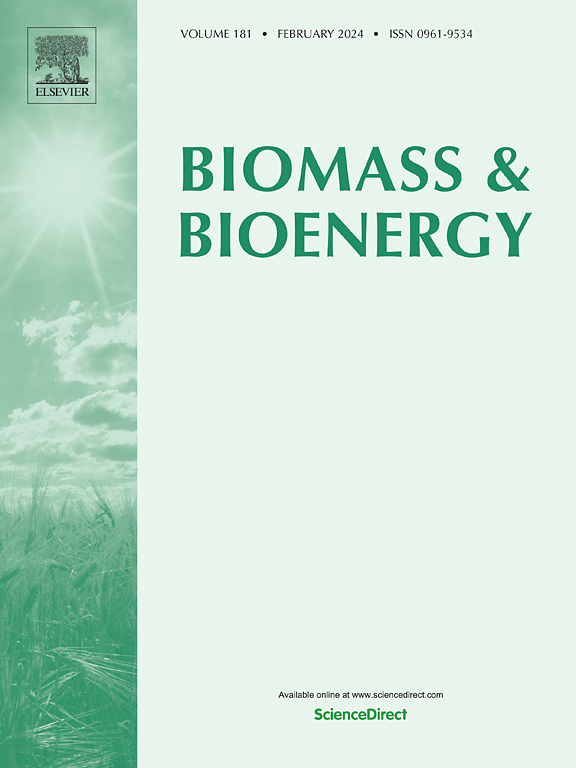pd基催化剂上木质素的热催化解聚:催化剂载体对单芳烃选择性的作用
IF 5.8
2区 生物学
Q1 AGRICULTURAL ENGINEERING
引用次数: 0
摘要
技术木质素的凝聚结构在将其转化为有价值的功能化构建块(如单环芳烃)方面提出了重大挑战。在这项研究中,我们探讨了钯基催化剂如何影响木质素快速热解解聚过程中单芳烃的选择性。系统研究了热解温度(500 <;T & lt;700°C)和催化剂负载性质(SiO2、Al2O3和Carbon)通过分析热解进行了表征。非催化和Pd/SiO2催化牛皮纸木质素热解后,其优势组分为Creosol和愈创木酚。而Pd/C和Pd/Al2O3对单芳烃的选择性显著提高,分别达到50.9%和34.4%。Pd/C和Pd/Al2O3的催化活性归因于载体中存在中弱酸位,为酚类物质的吸附和脱氧提供了活性位点。此外,金属Pd位点激活了C-O和H2键,进一步辅助脱氧反应,从而诱导了这些材料的双功能。该研究为木质素热催化解聚过程中负载型催化剂的双功能效应提供了有价值的见解。本文章由计算机程序翻译,如有差异,请以英文原文为准。

Thermo-catalytic depolymerization of lignin over Pd-based catalysts: Role of catalyst support on monoaromatics selectivity
The condensed structure of technical lignin presents significant challenges in converting it into valuable functionalized building blocks, such as single-ring aromatics. In this study, we explored how palladium-based catalysts influence the selectivity of monoaromatics during the fast pyrolysis depolymerization of lignin. A systematic study on the influence of the pyrolysis temperature (500 < T < 700 °C) and catalyst support nature (SiO2, Al2O3 and Carbon) was carried out by analytical pyrolysis. Creosol and guaiacol were the predominant species after non-catalytic and Pd/SiO2 catalyzed pyrolysis of Kraft lignin. However, when Pd/C and Pd/Al2O3 were applied, the selectivity to monoaromatics increased drastically, to 50.9 % and 34.4 %, respectively. The catalytic activity of Pd/C and Pd/Al2O3 was ascribed to the presence of medium and weak acid sites in the supports, which provides active sites for phenolics adsorption and deoxygenation. Additionally, metallic Pd sites activated the C-O and H2 bonds to further assist deoxygenation reactions, thus inducing a bifunctionality to these materials. This study offers valuable insights into the bifunctional effects of supported catalyst during the thermo-catalytic depolymerization of lignin.
求助全文
通过发布文献求助,成功后即可免费获取论文全文。
去求助
来源期刊

Biomass & Bioenergy
工程技术-能源与燃料
CiteScore
11.50
自引率
3.30%
发文量
258
审稿时长
60 days
期刊介绍:
Biomass & Bioenergy is an international journal publishing original research papers and short communications, review articles and case studies on biological resources, chemical and biological processes, and biomass products for new renewable sources of energy and materials.
The scope of the journal extends to the environmental, management and economic aspects of biomass and bioenergy.
Key areas covered by the journal:
• Biomass: sources, energy crop production processes, genetic improvements, composition. Please note that research on these biomass subjects must be linked directly to bioenergy generation.
• Biological Residues: residues/rests from agricultural production, forestry and plantations (palm, sugar etc), processing industries, and municipal sources (MSW). Papers on the use of biomass residues through innovative processes/technological novelty and/or consideration of feedstock/system sustainability (or unsustainability) are welcomed. However waste treatment processes and pollution control or mitigation which are only tangentially related to bioenergy are not in the scope of the journal, as they are more suited to publications in the environmental arena. Papers that describe conventional waste streams (ie well described in existing literature) that do not empirically address ''new'' added value from the process are not suitable for submission to the journal.
• Bioenergy Processes: fermentations, thermochemical conversions, liquid and gaseous fuels, and petrochemical substitutes
• Bioenergy Utilization: direct combustion, gasification, electricity production, chemical processes, and by-product remediation
• Biomass and the Environment: carbon cycle, the net energy efficiency of bioenergy systems, assessment of sustainability, and biodiversity issues.
 求助内容:
求助内容: 应助结果提醒方式:
应助结果提醒方式:


